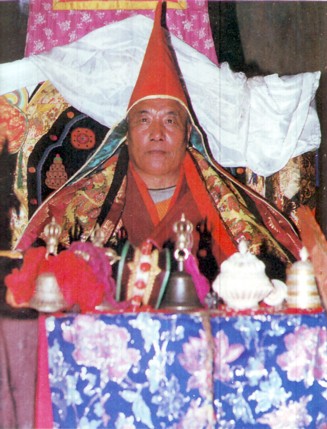Sherab Özer Rinpoche: Difference between revisions
No edit summary |
No edit summary |
||
| Line 1: | Line 1: | ||
[[Image:Sherab Ozer.jpg|frame|'''Sherab Özer Rinpoche''']] | [[Image:Sherab Ozer.jpg|frame|'''Sherab Özer Rinpoche''']] | ||
'''Sherab Özer Rinpoche''' was born in 1922 and was recognised as the incarnation of Orgyen Rigdzin Sempa Dorje, the main Dharma heir of the great master [[Nyala Pema Duddul]]. From an early age he studied with many revered masters in East Tibet. | '''Sherab Özer Rinpoche''' ([[Wyl.]] ''shes rab 'od zer'') was born in 1922 and was recognised as the incarnation of Orgyen Rigdzin Sempa Dorje, the main Dharma heir of the great master [[Nyala Pema Duddul]]. From an early age he studied with many revered masters in East Tibet. | ||
At twelve, he studied the sutras for three years at [[Lumo Rab]], a monastery which has a very strong connection with the great [[Mindroling Monastery]] in Central Tibet. In fact, it was from | At twelve, he studied the sutras for three years at [[Lumo Rab]], a monastery which has a very strong connection with the great [[Mindroling Monastery]] in Central Tibet. In fact, it was from Minling Khenchen Rinpoche<ref>Most probably the Ninth Minling Khenchen, Nangdzé Drubpé Dorje.</ref> and [[Minling Chung Rinpoche]] that he received the name Sherab Özer. | ||
At the age of 21, he went to live in the ''[[labrang]]'' at [[Kalsang Gonpa]], the seat of Nyala Pema Duddul, which later became the seat of [[Tertön Sogyal]] Lerab Lingpa. He received the teachings and profound instructions of Dzogpachenpo from Tulku Dorje Duddul at Dre Tsal Monastery, the empowerments and teachings for Nyala Pema Duddul’s revelation ''Zabchö [[Khakhyab Rangdrol]]'' from Jazi Anyé Tulku, and studied and practised with masters of the [[Sakya]], [[Gelug]] and [[Nyingma]] schools. | At the age of 21, he went to live in the ''[[labrang]]'' at [[Kalsang Gonpa]], the seat of Nyala Pema Duddul, which later became the seat of [[Tertön Sogyal]] Lerab Lingpa. He received the teachings and profound instructions of Dzogpachenpo from Tulku Dorje Duddul at Dre Tsal Monastery, the empowerments and teachings for Nyala Pema Duddul’s revelation ''Zabchö [[Khakhyab Rangdrol]]'' from Jazi Anyé Tulku, and studied and practised with masters of the [[Sakya]], [[Gelug]] and [[Nyingma]] schools. | ||
In 1949, Sherab Özer Rinpoche was asked by Chinese government to help in local affairs, and later, during the Cultural Revolution, he passed through many difficulties. In 1981, he visited a number of different monasteries, as a result of which he set up, in Sichuan province, thirty four “Cultural Heritage Protection Associations”. In 1984, Rinpoche founded the Sichuan Province Tibetan Buddhist Institute. | In 1949, Sherab Özer Rinpoche was asked by Chinese government to help in local affairs, and later, during the Cultural Revolution, he passed through many difficulties. In 1981, he visited a number of different monasteries, as a result of which he set up, in Sichuan province, thirty four “Cultural Heritage Protection Associations”. In 1984, Rinpoche founded the Sichuan Province Tibetan Buddhist Institute. | ||
==Visit to Lerab Ling== | |||
In 1998, Sherab Özer Rinpoche stayed in [[Lerab Ling]] for several months and gave several teachings and [[empowerment]]s to the [[Rigpa]] [[sangha]]. On August 12th 1998, Sherab Özer Rinpoche performed a simple, symbolic ceremony in which he offered the throne of [[Kalzang Monastery]] to [[Sogyal Rinpoche]] as the heir to [[Tertön Sogyal]]. | |||
==Further Reading== | |||
*''Rigpa Journal, January 2000''', 'On an Island of Wish-fulfilling Jewels' | |||
*'Brief Outline of the History of Kalsang Gompa', compiled by Sherab Özer and Changchub Gyatso, published by ''si khron mi rigs dpe skrun khang'': (The Ethnic Minorities Publishing House, Chengdu, China) | |||
==Notes== | |||
<small><references/></small> | |||
[[Category:Contemporary Teachers]] | [[Category:Contemporary Teachers]] | ||
[[Category:Nyingma Teachers]] | [[Category:Nyingma Teachers]] | ||
Revision as of 16:05, 28 December 2008

Sherab Özer Rinpoche (Wyl. shes rab 'od zer) was born in 1922 and was recognised as the incarnation of Orgyen Rigdzin Sempa Dorje, the main Dharma heir of the great master Nyala Pema Duddul. From an early age he studied with many revered masters in East Tibet.
At twelve, he studied the sutras for three years at Lumo Rab, a monastery which has a very strong connection with the great Mindroling Monastery in Central Tibet. In fact, it was from Minling Khenchen Rinpoche[1] and Minling Chung Rinpoche that he received the name Sherab Özer.
At the age of 21, he went to live in the labrang at Kalsang Gonpa, the seat of Nyala Pema Duddul, which later became the seat of Tertön Sogyal Lerab Lingpa. He received the teachings and profound instructions of Dzogpachenpo from Tulku Dorje Duddul at Dre Tsal Monastery, the empowerments and teachings for Nyala Pema Duddul’s revelation Zabchö Khakhyab Rangdrol from Jazi Anyé Tulku, and studied and practised with masters of the Sakya, Gelug and Nyingma schools.
In 1949, Sherab Özer Rinpoche was asked by Chinese government to help in local affairs, and later, during the Cultural Revolution, he passed through many difficulties. In 1981, he visited a number of different monasteries, as a result of which he set up, in Sichuan province, thirty four “Cultural Heritage Protection Associations”. In 1984, Rinpoche founded the Sichuan Province Tibetan Buddhist Institute.
Visit to Lerab Ling
In 1998, Sherab Özer Rinpoche stayed in Lerab Ling for several months and gave several teachings and empowerments to the Rigpa sangha. On August 12th 1998, Sherab Özer Rinpoche performed a simple, symbolic ceremony in which he offered the throne of Kalzang Monastery to Sogyal Rinpoche as the heir to Tertön Sogyal.
Further Reading
- Rigpa Journal, January 2000', 'On an Island of Wish-fulfilling Jewels'
- 'Brief Outline of the History of Kalsang Gompa', compiled by Sherab Özer and Changchub Gyatso, published by si khron mi rigs dpe skrun khang: (The Ethnic Minorities Publishing House, Chengdu, China)
Notes
- ↑ Most probably the Ninth Minling Khenchen, Nangdzé Drubpé Dorje.